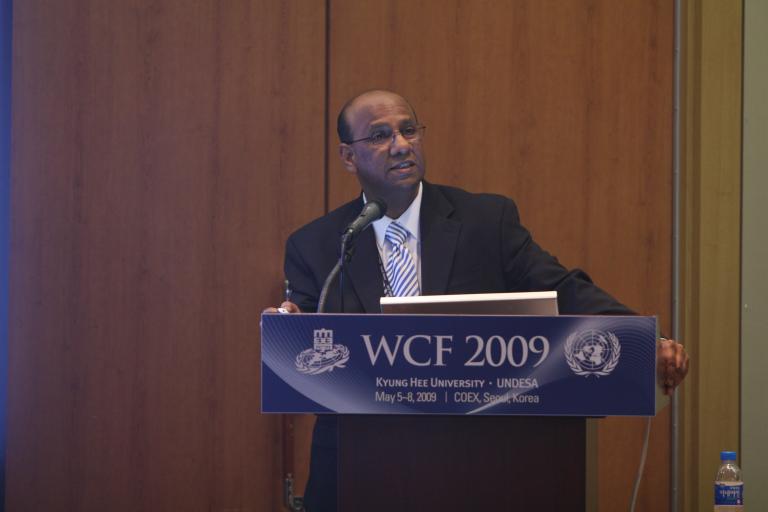
Dr. Badri Rao, associate professor of Liberal Studies, chaired the Human Security and Peace in South and Southeast Asia session during the United Nations World Civic Forum 2009 in Seoul, South Korea May 5 – 8.
The first-ever World Civic Forum, “Building Our Humanitarian Planet," was organized by Kyung Hee University in partnership with the U.N. Department of Economic and Social Affairs (UNDESA). The forum covered three key issues stemming from the U.N. Millennium Declaration pledging to make the world better for all by 2015. The three issues were: Civic Values for Global Justice; Civic Engagement in Public and Global Governance; and Civic Action for the Global Agenda Including Climate Change.
Rao presented his paper “Turning Swords into Plowshares; Promoting Human Security and Tolerance in the Context of Terrorism in South Asia,” May 8, in conjunction with two other presenters addressing human security and peace in South and Southeast Asia.
His premise is that trade relations can be utilized to reduce conflict between hostile countries. Rao referenced the situation between his native India and Pakistanas an example, specifically the November 2008 attacks in Mumbai by members of Lashkar-e-Taiba, the Pakistan-based militant organization, considered a terrorist organization by many countries including India, the United States, and the United Kingdom.
Since gaining independence in 1947, India and Pakistan have engaged in four wars and hundreds of terrorist attacks, creating endemic animosity and hostility between the two, according to Rao.
“The 2008 attacks in Mumbai outraged India collectively when it became clear that Pakistan was involved,” said Rao. “Indians demanded the Indian government make surgical strikes on known terrorist training camps in Pakistan,” he added.
However, the government of India was in a delicate situation as it had to reckon with the domestic and international implications of such demands, he explained. Aside from potentially disastrous economic implications, the country has the second largest Muslim population in the world (after Indonesia), and if they bow to internal pressure and attacked Pakistan, they run the risk of worsening already fragile Hindu-Muslim relations and jeopardizing the safety of Muslims in India. “Also, India cannot attack Pakistan and expect no retaliation,” he added.
On the other hand, Pakistanis viewed internationally as a sponsor of terrorism, said Rao, with its elites and the military patronizing terrorist groups to legitimize their rule and to settle scores with India. But Pakistani leaders can no longer manage the extremists within their borders as the spate of terrorist attacks in Pakistan amply prove. “And with increasing international pressure against state-sponsored terrorism, if they continue to sponsor terrorism they will become pariahs in the international community,” said Rao.
“Both countries have serious challenges ahead of them, and limited options,” he said. The most pragmatic strategy for promoting peace and tolerance in South Asia is by advancing human security and not just state security, according to Rao. “Human security ensures there is all-around human development, he said.
India and Pakistan must vigorously pursue the Millennium Development Goals, said Rao. “The two countries need to set aside old animosities and move beyond the 'burden of history',” he said. “I think India and Pakistan can put their heads together and collaborate, but this calls for enlightened leadership. They should promote trade and collaborate in the area of human development. The more you trade the less incentive you have to go to war,” he said.
Pursuing civic nationalism as opposed to religious nationalism: emphasizing social inclusion and tolerance in education; stressing the common cultural ties of India and Pakistan, providing aid to Pakistan in exchange for assurances of curbing terrorism; and threatening international isolation are some of the steps Rao outlines for effectively defusing terrorism.
While some may view his position too idealistic, Rao feels that if the area continues to fester, the situation will only get worse.
If, however, the Indian government tries to win the hearts and minds of the Pakistani people through trade and humanitarian efforts, it could serve to isolate the terrorists and they wouldn’t have as much influence on the general population, hypothesizes Rao. “Human development is the best antidote against the alienation of disaffected terrorists,” he said.
In the long term, Rao would like to see a South Asian Union similar to the European Union.
Like Rao, the more than 2500 participants at the World Civic Forum are hopeful that their work will help formulate U.N. policies and assist in the accomplishment of the Millennium Development Goals. “The whole idea of the forum was to find the ways and means to create a more humanitarian planet,” he said”
In addition to the UN conference, Rao was also gave a talk titled ‘Prospects for South Asia in the 21st Century’ at the Hankuk University of Foreign Studies in Seoul.
For more information about Dr. Rao’s research and work in the areas of human security and peace in South Asia, contact him at brao@kettering.edu.
Written by Dawn Hibbard
810.762.9865
dhibbard@kettering.edu